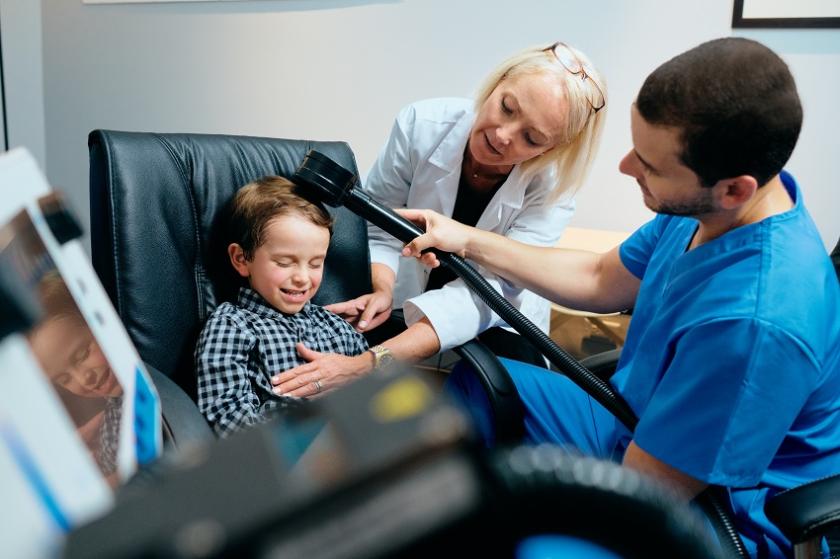The growth and development of your child’s brain are directly related to their quality of life. It is the brain that can affect all aspects of health, right from muscle movement to cognitive thinking.
Brain damage or brain abnormalities can compromise your child’s eyesight, memory, speech, smelling/hearing senses, and even cause mental disorders such as Schizophrenia!
Neurology is the branch of medical science that specializes in health conditions associated with the nervous system. If your child suffers from any brain, muscle, nerves, or spinal cord problems, then you must consult a pediatric neurologist.
Who is a pediatric neurologist?
A pediatric neurologist specializes in neurological disorders in children ranging from infancy to adolescents. These healthcare professionals know what symptoms to look out for in children and how to assess and appropriately diagnose the disease or health condition in question. Since they have immense knowledge and experience, their consultation can help you treat your child’s neurological disorders, be it simple or complex. The neurologist will you ask a couple of questions includingthe child’s history. After which, an MRI or CT scan might be performed based on your doctor’s assessment.
When should you seek a neurological consultation for your child?
It is essential to observe your child’s health pattern from time to time. In case your child shows any symptoms of ill health then, it can either be a regular cold/flu or any other minor illness or in some cases certain signs maybe an indication of a more severe health complication. Below is a list of some signs that you should observe carefully in your child:
- Chronic headaches or migraines
- Imbalance in motor function
- Weak muscle movement
- Seizures
- Sudden compromised vision
You should see a pediatric neurologist at the earliest if you notice the signs mentioned above for a prolonged period.
What symptoms highlight an underlying neurological disorder for your child?
Babies born with congenital abnormalities, premature babies, brain damage or injury, accident impacting the brain are all reasons that can lead to neurological disabilities. A few common symptoms you should be aware of are:
- A headache that is at a constant scale of pain for prolonged periods can indicate signs of a much more severe condition that must be checked immediately.
- Suppose any of your child’s sensory organs are compromised; for example, your child has been complaining of sudden blurry/double vision coupled with a migraine, then do not misdiagnose it for an eyesight problem. To cross out any underlying neurological condition, you should see a neurologist.
- It is normal to be forgetful.However, if your child has sudden short-term memory loss of certain events or things for an extended period, it could be an indication of something significantly serious.
- Muscle weakness, trembling, or not feeling certain sensations on the feet or lower half can indicate a cause for alarm. This could be a sign of a neurodegenerative disease that a trained professional must diagnose at the earliest.
- If your child develops slurred speech, impaired language, or lack of coordination in muscle movement, it could be possible that it is a spinal health condition. Pain felt in the feet, hands, and other parts of the body is also something to be cautious about.
What are some common neurological disorders seen in children?
- A somewhat common problem that’s usually misdiagnosed is a simple headache! While children and even adults can get a regular headache from time to time, a more consistent headache coupled with other symptoms can indicate a disorder in the brain or other parts of the body.
- Another disorder that can impact a child’s quality of life tremendously is Cerebal Palsy. This is a brain abnormality that usually occurs before birth and can continue to affect the child through their life. While there is medication, therapy, and surgery to minimize the effects, it is a life-changing disorder. It involves rigid and unpredictable muscle movements and impaired reflexes.
- Children from the ages of 5-12 can sometimes develop problems in school; they might be slower in grasping concepts, they might not be able to learn certain words or numbers or write similar letters or digits irreplaceably. This condition is called Dyslexia. While it is a learning disorder and does not directly involve an abnormal brain function, it has a hereditary component involved in it.
- Amongst other disorders are Autism and Dyspraxia, which essentially impact communication and motor skills. These conditions are a result of neurological abnormalities.
- One of the most common neurological disorders seen in children is Epilepsy. This is a disorder of the nervous system that induces seizures, including sudden rigidity, vigorous trembling/shaking with closed fits, stiff muscles, face twitching, losing consciousness, uncontrollable bladder/ bowel movement, etc. Different parts of the brain trigger different types of seizures. It is vital to get a diagnosis from a pediatric neurologist for your child’s epilepsy.
Can neurological disorders or abnormalities be cured?
While some conditions like a tumor or an aneurysm can be surgically removed and fixed, certain other conditions such as cerebral palsy or Parkinson’s disease, which involves nerve damage, cannot be cured. By acquiring help from a pediatric neurologist in time, you can reduce the drastic impact of the symptoms that can worsen without any action. Brain damage that occurs due to accidents or external force can result in dangerous and even fatal outcomes. So, ensure that your child is safe and cautious at all times to avoid any such mishaps.
This is general information issued in public interest. Please contact your doctor for more details.

